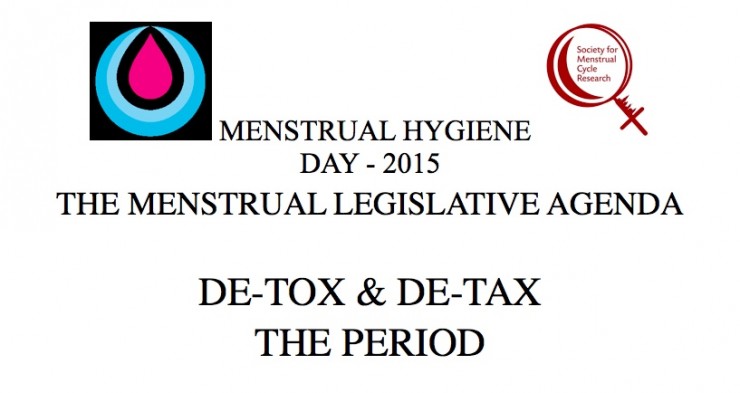Although the social status and understanding of the menstrual cycle has (at least among industrialized and relatively better educated societies) improved slowly but perceptibly over the past 50 years, there are still many ways that menstruation is still stigmatized and used as a way to diminish women. Period jokes, PMS slurs, and even jibes at women’s capacity to hold political office or conduct political debates abound. For these reasons the SMCR has often broadened the scope of its efforts beyond the realm of “research” stated in the organization’s name to include artistic endeavors as well as political and social activism.
 Social activism includes a variety of campaigns such as provision of menstrual management products to homeless and incarcerated women or raising awareness of the environmental impact of disposable products. In the area of political action there are two separate initiatives currently in the works. In order to highlight the relationship between the two efforts in conjunction with Menstrual Hygiene Day (May 28) 2015, I coined the slogan De-Tox & De-Tax The Period.
Social activism includes a variety of campaigns such as provision of menstrual management products to homeless and incarcerated women or raising awareness of the environmental impact of disposable products. In the area of political action there are two separate initiatives currently in the works. In order to highlight the relationship between the two efforts in conjunction with Menstrual Hygiene Day (May 28) 2015, I coined the slogan De-Tox & De-Tax The Period.
The De-Tox part of the two-pronged campaign focuses on a piece of legislation that has been introduced into the U.S. Congress by Congresswoman Carolyn Maloney, H.R. 1708: Robin Danielson Feminine Hygiene Product Safety Act of 2015. The aim of the bill is to require the regulation and testing of the content and manufacture of menstrual management products. A separate blog post later this month will spell out the details of the bill and suggest ways of advocating on its behalf.
The De-Tax aspect of the political effort concerns the levying of sales taxes on the purchase of tampons, pads, and other similar products. In the U.S. this is a difficult topic to mobilize around since sales tax policies vary widely as they are levied under state, city or other municipal authorities. Currently only five states have exempted menstrual products from sales taxes: New Jersey, Pennsylvania, Minnesota, Maryland, and Massachusetts. See this Fusion post for complete state-by-state details.
In some other countries where sales taxes are nation-wide mandates, organizing against them is easier. For instance, a drive in Canada was successful in garnering wide support and led to the repeal of the federal Goods and Services Tax (GST) on all menstrual products as of July 1st, 2015. Similarly, activists in Australia have succeeded in raising a nation-wide drive to mobilize support for the elimination of menstrual product taxation.
Simply put, this is a discriminatory, gender-based tax that is paid almost exclusively by women.
In New York City there is a move in the City Council to address the problem; however, the NYC budget structure is linked to the state legislature’s approval so the drive faces numerous bureaucratic and procedural roadblocks. A separate item dealing with this topic will be posted later in the month.
For now, the first step toward bringing about change is to ascertain what the tax practice is in any particular setting and, where anti-women menstrual taxes exist, to educate both elected officials and the general public about them. Even for those individuals who can easily afford the extra fee on their monthly purchases, the issue has symbolic significance that warrants attention. It’s taxing enough just to cope with the social demands placed upon women. It’s time to eliminate the additional fee.
David Linton is an Emeritus Professor at Marymount Manhattan College. He is also Editor of the SMCR Newsletter and a member of the re: Cycling editorial board. His research focus is on media representations of the menstrual cycle as well as how women and men relate to one another around the presence of menstruation.

